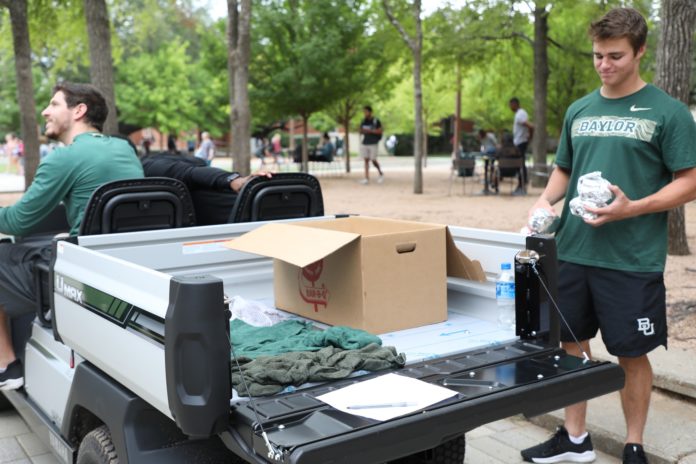
By Ben Everett | Sports Editor
If you’re a Baylor student, there’s a chance you’ve seen a football player being driven across campus in a golf cart or being delivered lunch at Fountain Mall or in front of the Student Life Center.
These are just two of the perks available to football players at Baylor. Others include having access to the athlete-only dining hall, the Beauchamp Athletics Nutrition Center (or the BANC), and receiving Baylor gear such as shirts and shorts on a routine basis.
Murfreesboro, Tenn., freshman Will Ledbetter said he has heard other students voice their discontentment with the football players receiving these perks.
“They’re kind of upset like, ‘[the football players] are getting driven around to class and we’re walking,'” Ledbetter said. “Just a general annoyance.”
Taylor Bryan, Baylor football spokesperson said lunch delivery is not a service but it is offered by the athletics department, but sometimes conflicting class schedules result in the football players’ inability to make time for lunch, hence the delivery.
Former Baylor football quarterback Mike Everett provided some perspective on the situation. Everett committed to play football for Baylor University without receiving an athletic scholarship. He walked on in spring of 2018, but just four days into fall camp, Everett made a decision to devote his time to academics.
Given that there are 103 players on Baylor’s roster and only 11 players can be on the field at a given time, the coaches are forced to find a way to filter through the roster. Everett said football players, especially if they want to be a starter or play significant minutes, must devote all of their time to football.
“The only reason they’re getting their food delivered is because they have no time,” Everett said. “It’s really because they have two to three hours of meetings every day, three-hour practices and constant film. And that’s the bare minimum. That’s the real part that no one else sees; if you want to be a starter, or even if you want to move up the depth chart. If you want to be the second string, or if you want to be on the special teams, you’ve got to be up there more than the other guys. You’ve got to be up there with the coaches. You’ve got to be grinding.”
Baylor plays in one of college football’s “power-five” conferences, meaning the Bears compete against nine of the 64 most prestigious athletic institutions in the NCAA when they play Big 12 schools.
Everett said being a football player at a major university makes your life more stressful, so receiving these perks starts becoming necessities.
“At the end of the day, there’s a lot that comes with it,” Everett said. “There’s got to be some positives to playing football. It’s so hard and the coaches are so hard on the players. The expectations that coach Rhule puts on the players and the coaches makes the team better, but it makes your life more stressful. It makes the rewards even better because everyone is held to that standard. It makes it worth it and [the football players] reap the benefits of it because they get to go to the best facilities, get the best food, and they get driven around campus.”
The football program’s bevy of coaches take turns driving players around campus and delivering lunch. It’s never the major coaches, like Rhule, but rather the graduate assistants or lower-level coaches, Everett said.
Lunch delivery, shuttling, nutrition center access and free Baylor gear also tie into recruiting. Everett said no one will want to play football at Baylor if they don’t offer these perks.
“A lot of the perks you see athletes get is because you’re trying to get the best athletes to come to your school; it’s recruiting,” Everett said. “If you’re just giving your kids a bunch of crappy stuff, of course no one’s going to want to go to Baylor. They’re obviously going to get the best, newest stuff so that they can keep kids. It’s all for a reason. Football makes a lot of money, so it makes sense that they put money back into it.”
Ledbetter echoed Everett’s sentiments, saying he disagrees with the general student opinion regarding football player perks.
“I think with the amount of time they’re putting in to play football and still go to class, it’s fair,” Ledbetter said. “I’ve heard a lot of people voice opinions opposite of that, but I think it’s all right. They deserve it with the amount of time they’re putting in.”





